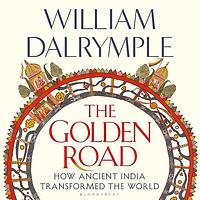Take a photo of a barcode or cover
informative
Book 3 of 2025!
'The Golden Road - How Ancient India Transformed the World' by William Dalrymple
This book stands as one of the finest analyses of India's remarkable influence on the world. It's an eye-opener that challenges many false narratives.
I can't help but wish for this book to be adapted into an extensive semi-documentary series, with Mr. Dalrymple himself guiding us through it.
This work is a product of meticulous research, demanding thorough rereading and a diligent examination of notes and references. It's perfect for anyone with even a remote interest in history.
Mr. Dalrymple convincingly chronicles how so much originated in the subcontinent and spread across the globe. He traces the birth and spread of religions throughout the Indosphere, illustrating how ancient India was revered as a mystical fountainhead of knowledge and cultural sophistication. The book leaves us contemplating whether India can once again become the guiding light of knowledge for the 21st-century world.
@williamdalrymple Thank you sir!
'The Golden Road - How Ancient India Transformed the World' by William Dalrymple
This book stands as one of the finest analyses of India's remarkable influence on the world. It's an eye-opener that challenges many false narratives.
I can't help but wish for this book to be adapted into an extensive semi-documentary series, with Mr. Dalrymple himself guiding us through it.
This work is a product of meticulous research, demanding thorough rereading and a diligent examination of notes and references. It's perfect for anyone with even a remote interest in history.
Mr. Dalrymple convincingly chronicles how so much originated in the subcontinent and spread across the globe. He traces the birth and spread of religions throughout the Indosphere, illustrating how ancient India was revered as a mystical fountainhead of knowledge and cultural sophistication. The book leaves us contemplating whether India can once again become the guiding light of knowledge for the 21st-century world.
@williamdalrymple Thank you sir!
Supported a ton of sources to back up the narrative, The Golden Road: How Ancient India Transformed the World by William Dalrymple that falls under the category of popular history is a wonderful read for anyone who likes to see people in history come alive.
The ten chapters that constitute this book — apart from an equally lengthy Notes with references—handle thousand years of history; from the Classical Period (3rd cent. BCE) to the end of the Early Medieval Period (13th cent. CE) with a geographical canvas that spreads from Tunisia in the west to Chang’an (Xian) in the east.
If you have ever felt that history is a dry boring subject, this book is for you. William Dalrymple weaves historical figures that most of us would have seen in our history textbooks; like Xuanzong who among a lot of other things wrote a travelogue of his journey to India in the 7th cent. CE, Wu Zetian, the first and only woman emperor of China, Al-Khwarizmi, whose textbook written in the 9th cent. CE, the latin translation of which introduced the decimal-based positional numeral system in Europe, the Barmakids, originally Buddhist heads of the Navavihāra from Afghanistan in the 7th and 8th century.
If you have every felt that history is a dry classification of time into various periods, this books is for you. Dalrymple weaves the thread of ego, violence, imagination and intellect of humans, starting from the interaction between Alexander’s Macedonia and Mauryans in the 3rd cent. BCE; the Kushans in the 2nd and 3rd cent. with their winter capital in Kabul and the summer capital in present-day Patna; down south the Pallavas, the city of Mamallapuram and their trade with south-east asia in the 7th/8th century, the south-east asian hydraulic empire of the Khmers beginning in the late 8th century.
Dalrymple’s main argument is that the the knowledge that took birth in the Indian subcontinent later spread throughout the world, through the work of individuals such as Xuanzong and families like the Barmakids; with the patronage of empires such as Pallavas in the south, Mauryans and Kushans in the north, Khmer in the east and the Abbasid caliphate in the west.
This according to him is the Golden Road. Dalrymple uses the term Indosphere-as opposed to the Sinosphere-, a term originally used by linguists, to show the influence of ideas that were born in the Indian subcontinent in the rest of the world.
Founded by a Ukranian immigrant in 2009, WhatsApp became the world’s most popular instant messaging app by 2015. As a thirty-year old teacher, little did I know that the middle-aged uncles and aunties would hitch a ride on this and start consuming and spreading disinformation about the glorious past of India and how everything is in shambles because of the ancestors of a set of people they have been bigoted against.
Dalrymple’s book seems like a clarion call to these uncles and aunties to look at history and be proud of the syncretic nature of civilizations and ideas; that conquests, empires and kingdoms need to be understood in a much more complexed manner rather than as mere enemies pitted against each other.
As I write this, the sections of newspapers and YouTube channels that I devour are filled with articles regarding the excavations in an obscure village in present-day Tamil Nadu called Sivagalai in Thoothukudi where dozens of iron samples that date back to the 4th millenium BCE are soon going to rewrite the sections of the history textbooks that dealt with the iron age, earlier thought to have started in the 1st millenium.
I am a big fan of popular history, especially books like this one where half of the book is dedicated to providing references for the works cited.
The ten chapters that constitute this book — apart from an equally lengthy Notes with references—handle thousand years of history; from the Classical Period (3rd cent. BCE) to the end of the Early Medieval Period (13th cent. CE) with a geographical canvas that spreads from Tunisia in the west to Chang’an (Xian) in the east.
If you have ever felt that history is a dry boring subject, this book is for you. William Dalrymple weaves historical figures that most of us would have seen in our history textbooks; like Xuanzong who among a lot of other things wrote a travelogue of his journey to India in the 7th cent. CE, Wu Zetian, the first and only woman emperor of China, Al-Khwarizmi, whose textbook written in the 9th cent. CE, the latin translation of which introduced the decimal-based positional numeral system in Europe, the Barmakids, originally Buddhist heads of the Navavihāra from Afghanistan in the 7th and 8th century.
If you have every felt that history is a dry classification of time into various periods, this books is for you. Dalrymple weaves the thread of ego, violence, imagination and intellect of humans, starting from the interaction between Alexander’s Macedonia and Mauryans in the 3rd cent. BCE; the Kushans in the 2nd and 3rd cent. with their winter capital in Kabul and the summer capital in present-day Patna; down south the Pallavas, the city of Mamallapuram and their trade with south-east asia in the 7th/8th century, the south-east asian hydraulic empire of the Khmers beginning in the late 8th century.
Dalrymple’s main argument is that the the knowledge that took birth in the Indian subcontinent later spread throughout the world, through the work of individuals such as Xuanzong and families like the Barmakids; with the patronage of empires such as Pallavas in the south, Mauryans and Kushans in the north, Khmer in the east and the Abbasid caliphate in the west.
This according to him is the Golden Road. Dalrymple uses the term Indosphere-as opposed to the Sinosphere-, a term originally used by linguists, to show the influence of ideas that were born in the Indian subcontinent in the rest of the world.
Founded by a Ukranian immigrant in 2009, WhatsApp became the world’s most popular instant messaging app by 2015. As a thirty-year old teacher, little did I know that the middle-aged uncles and aunties would hitch a ride on this and start consuming and spreading disinformation about the glorious past of India and how everything is in shambles because of the ancestors of a set of people they have been bigoted against.
Dalrymple’s book seems like a clarion call to these uncles and aunties to look at history and be proud of the syncretic nature of civilizations and ideas; that conquests, empires and kingdoms need to be understood in a much more complexed manner rather than as mere enemies pitted against each other.
As I write this, the sections of newspapers and YouTube channels that I devour are filled with articles regarding the excavations in an obscure village in present-day Tamil Nadu called Sivagalai in Thoothukudi where dozens of iron samples that date back to the 4th millenium BCE are soon going to rewrite the sections of the history textbooks that dealt with the iron age, earlier thought to have started in the 1st millenium.
I am a big fan of popular history, especially books like this one where half of the book is dedicated to providing references for the works cited.
adventurous
challenging
informative
inspiring
reflective
medium-paced
informative
reflective
slow-paced
Was lucky enough to be invited to hear Dalrymple talk about the book in a gathering in KL. He was fascinating and completely transported the audience with his research, enthusiasm and wit. He has a very special ability to build bridges between past and present. All this is just as true of the book, and I greatly enjoyed the audiobook which the author reads.
I learned so much - had no idea about the influence of India on the ancient world and especially South-East Asia. Many of my preconceptions were overturned. Not sure how much of the detail my head has managed to retain so am sure will be picking this book again soon.
I learned so much - had no idea about the influence of India on the ancient world and especially South-East Asia. Many of my preconceptions were overturned. Not sure how much of the detail my head has managed to retain so am sure will be picking this book again soon.
adventurous
informative
mysterious
reflective
medium-paced
informative
challenging
informative
reflective
slow-paced
informative
slow-paced
informative
Dalrymple stated aim in this book is to revive an understanding of how significant India has been as a global power, especially east towards Arabia, North Africa and Europe, and west towards South-East Asia. This is largely achieved through his coverage of the development and spread of Buddhism and Hinduism, with a bit of Sanskrit, and the significance of numeral notation.
The book is interesting, but perhaps because I didn't come in unconvinced, I wasn't entirely sold on the structure. I found myself wanting to read more specific books on those specific things - especially the religions, where the rapid cultural conversion is fascinating, but I'm not sure coming out I entirely understand why.
I have come out with a new list of places I really, really want to visit though, so that was totally worth it.
The book is interesting, but perhaps because I didn't come in unconvinced, I wasn't entirely sold on the structure. I found myself wanting to read more specific books on those specific things - especially the religions, where the rapid cultural conversion is fascinating, but I'm not sure coming out I entirely understand why.
I have come out with a new list of places I really, really want to visit though, so that was totally worth it.
challenging
informative
inspiring
reflective
medium-paced



